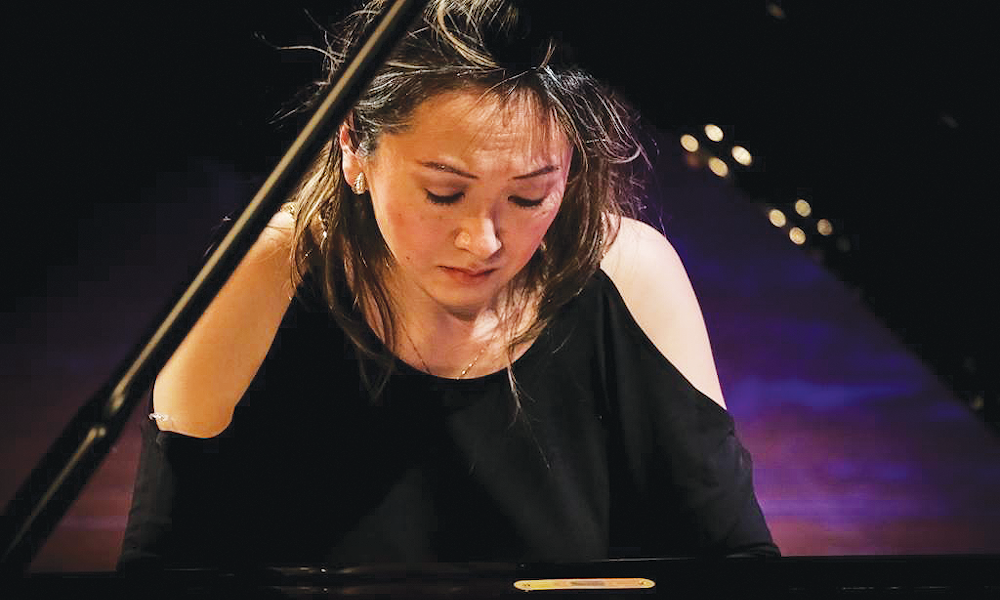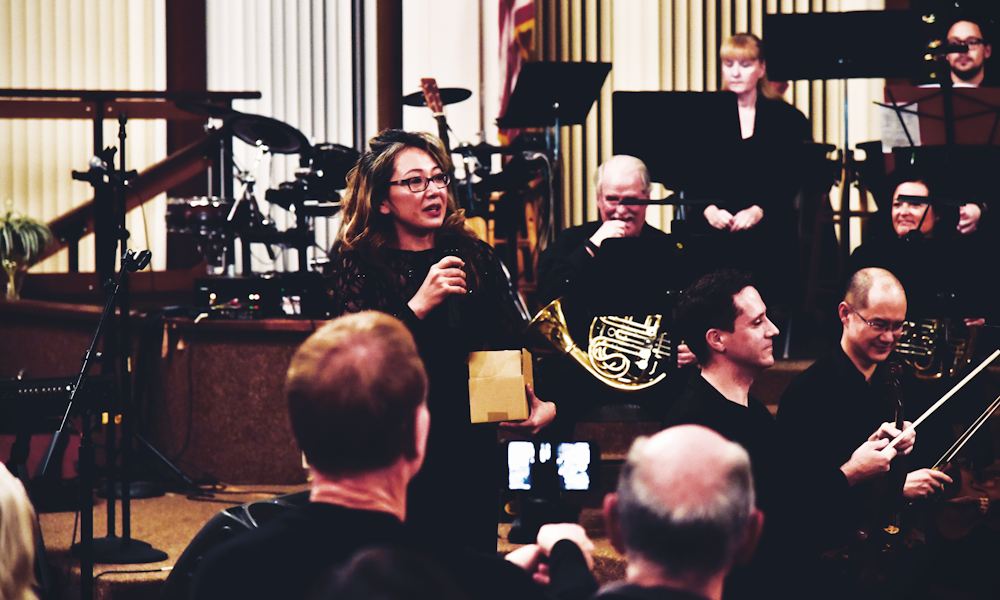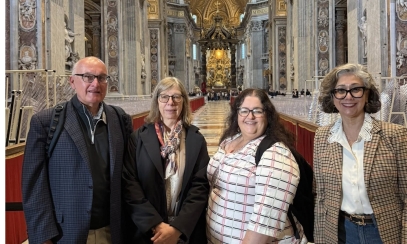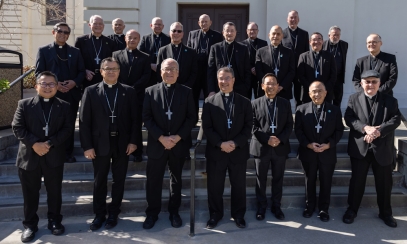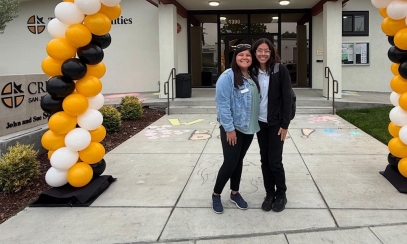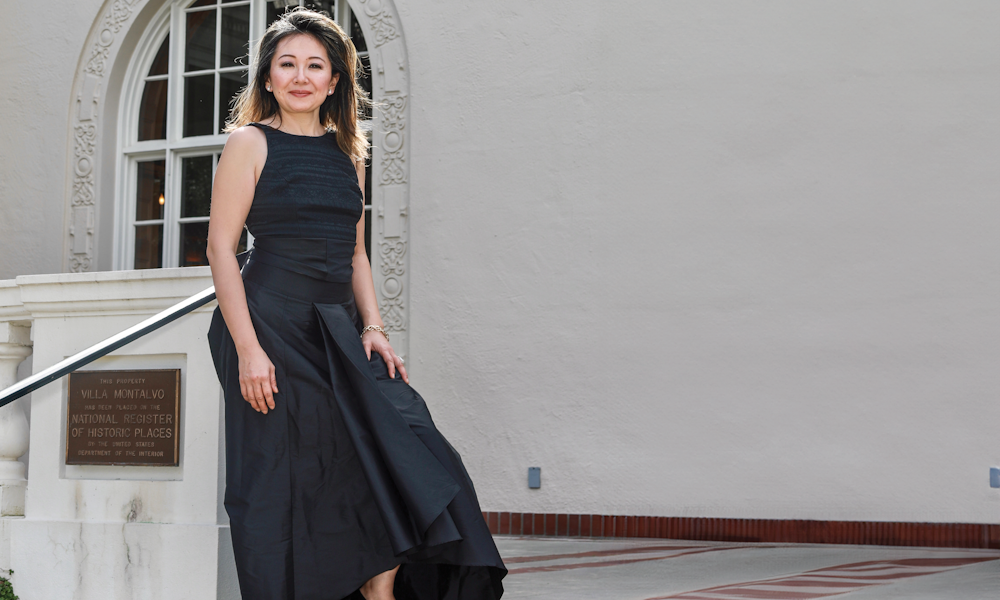
A Training in Love: Music Ministry
Saint Simon’s Tamami Honma’s Journey to Choir Director
Saint Simon’s Tamami Honma’s Journey to Choir Director
“Actual music lessons began at age three on the violin, but my mother taught piano, so I changed to the piano at four years old. Back then, there was a strong parenting philosophy against children learning two things simultaneously.” Half a century after switching to piano, Tamami Honma, parish choir director at Saint Simon Parish in Los Altos, defies the notion that doing more than one thing at a time is spreading herself too thin. Instead, it means spreading wide the wings of her musical, ministerial, and missionary disciple talents and soaring beyond anything she ever expected for herself.
“Actual music lessons began at age three on the violin, but my mother taught piano, so I changed to the piano at four years old. Back then, there was a strong parenting philosophy against children learning two things simultaneously.” Half a century after switching to piano, Tamami Honma, parish choir director at Saint Simon Parish in Los Altos, defies the notion that doing more than one thing at a time is spreading herself too thin. Instead, it means spreading wide the wings of her musical, ministerial, and missionary disciple talents and soaring beyond anything she ever expected for herself.
Tamami serves on the music faculties of Stanford University and Santa Clara University. In addition to performing internationally and leading master classes, she recently became the first pianist to record all of Beethoven’s 35 sonatas on the modern piano. “It is a great honor,” she told The Valley Catholic. She founded and directs the local Cal Arte Ensemble while privately teaching piano and coaching on many instruments, including voice. She and her four children also lend their talents to various local worship spaces across the valley.
Musician
At four years old, while living in Japan, Tamami entered a competition where a Brigham Young University professor sat as judge. Honma shared what came next, “He somehow mentioned to my mother that if we were ever in America, we ought to look up the University. Less than a year later, my mother picked up her two grand pianos, and we went to Utah to knock on his door.” While in Utah, as Tamami described, “It seemed like a very normal thing to play the piano, and most children learned enough to be able to play in churches.” While she frequently competed musically, she shared that it was difficult to find true belonging: “I felt quite alone, and so I didn’t mind going ahead and moving to New York to start the next stage of my training at 16.”
While in New York, she auditioned and was accepted as a student of Byron Janis, who was popularly known as the Pianist of Romantic Tradition before his passing in March this year. She befriended Byron’s wife, Hollywood legend Gary Cooper’s daughter, Maria Cooper Janis. Working with the couple also marked the first time Tamami worked with a devout Catholic, Maria, and the Jewish Byron. “They made me feel at home and helped me view becoming a musician as a most natural thing.” They also cared for her mental and spiritual well-being, with Maria recommending books like The Little Prince by Antoine de Saint-Exupéry, a classic text full of Christian symbolism.
Ministry
Tamami’s was a journey of love; she confessed, “With music, it feels like a relationship where you get back more than you put in.” Tamami is profoundly inspired by the 18th-century Baroque composer Johannes Sebastian Bach. “For me, his music touches on the divine, and he wrote many sacred works, but also secular. My love of Bach’s music was also a huge driving force in me wanting to keep seeking the divine.” Many artists seek the divine by pursuing perfection in music. This is how her early experience of God stands out in Tamami’s memory. “I had a lot of time to practice my piano. I always felt a presence; I always had God.”
As Honma established herself as an artist and mother, she discovered the joyful reciprocity between love, music, and, eventually, her ministry; as she puts it, “The more you can learn to love your family, your friends, love nature, love God, the more your love of music grows.” She came to California in 2008 and became choir director for St. Simon Parish in 2017.
At Saint Simon’s, Tamami finds herself most inspired by witnessing singers’ vocal abilities grow, and their music flourish through their faith. She speaks with pride about her parish choir. “Saint Simon has several excellent in-house singers that grew out of the choir programs and now we even receive requests to send cantors for special occasions.” For her, this experience is reminiscent of her time in Utah, where churches are the predominant hub for music training. She discussed what this meant for her own family: “Saint Simon is blessed to be able to bring in several orchestral accompaniments: sometimes those are my own children.”
A Training in Love
Honma speaks of choirs as safe places for singers and musicians across all age groups. “In a choir, when you are learning, you are spreading your wings. If one person falls, we all fall and get right back up together. It is that kind of environment that musicians need.” This confidence-building micro-community not only makes for a better, more engaging liturgy, but, to surprising effect, it strengthens the family. In her experience, “Parents who also participate are thrilled to have this experience alongside their children as song leaders for Mass. It is wonderful.”
Tamami attests strongly to this, “As parents, we want nothing better than for our children to grow and to see them flourish musically, and if they do so in a place where they feel accepted, I bet you they will want to play for these services.” With today’s technology, rehearsing can also take place remotely, as during the pandemic when Tamami held weekly virtual choral rehearsals for families. These experiences have led to Tamami’s assertion of her role as a choir director. She elaborated on her belief, “Music ministry is like a science of compassion and kindness. I think we are all happier knowing that we are connected and not isolated souls, and music is one thing that can bind us together. It is a training in love.”
The Holy Mass
In Tamami’s journey, missionary discipleship has impacted her faith significantly. “I have by now served in over a thousand services, and there have been many things during this time where I felt divine intervention or an encounter with the sacred. I feel like music ministry has always been my mission.” She shared that Saint Simon is the most intensive and longest-running role in any church she has served in. Whereas she began by seeing it as a job, she now says, “I look forward to listening to the homilies by the priests I have gotten to know well over the years.”
She related a recent liturgical example of a moment when music and the movements of the Mass came together. “Last Sunday, Father Dat’s homily was captured in spirit and words so precisely in the music, he excitedly came over after Mass to see if we had also noticed! And it was just an awesome moment the choir shared with Father. It was a Holy Spirit moment!”
Music as Missionary Discipleship
She explained, “Music has power you cannot see, but it is palpable, visceral, and direct; there is memory in a melody. Someone once told me, and I think this is true, that you might be at a store or anywhere, and suddenly a tune comes into your mind, and you can very clearly remember the tune to the refrain of the psalm or any of the songs we sang. In other words, through music, the parts of the liturgy are there in your memory.” For Tamami, this is a poignant reminder that music is a joyful but serious ministry.
Tamami is resolved to continue to pass on her gifts through sacred melody. “I feel even more strongly that it is our moral obligation to pass music to the next generation with sincerity, joy, respect, and discipline. When we are finally ready to serve as music ministers, our hearts are ready to magnify His glory, and we have something to thank God for in our hearts.” Tamami’s message to all musicians reading this is that music ministry brings practice, proficiency, and spirituality together. She explained, “You don’t have to be religious in your spiritual views, but I think it helps to understand the feeling of touching something of the sacred.”
As much as it is a personal responsibility, it is also a great personal joy. “I always feel happier after playing at Mass. It is so personal, and we put so much work into it.” This is a joy that she invites congregants to express fully. She has this to say to all Catholics: “My message to readers: please just make so much noise! And when you sing, it is hard not to feel happy. When the entire church sings together - there is no other sound quite like it in the world.”
Tamami Honma is the parish choir director at St Simon’s Catholic Parish Church in Los Altos and a lecturer in the music department at Stanford University. She enjoys spending time with family, experimenting with new recipes, connecting with new friends and solving NYT daily puzzles.

